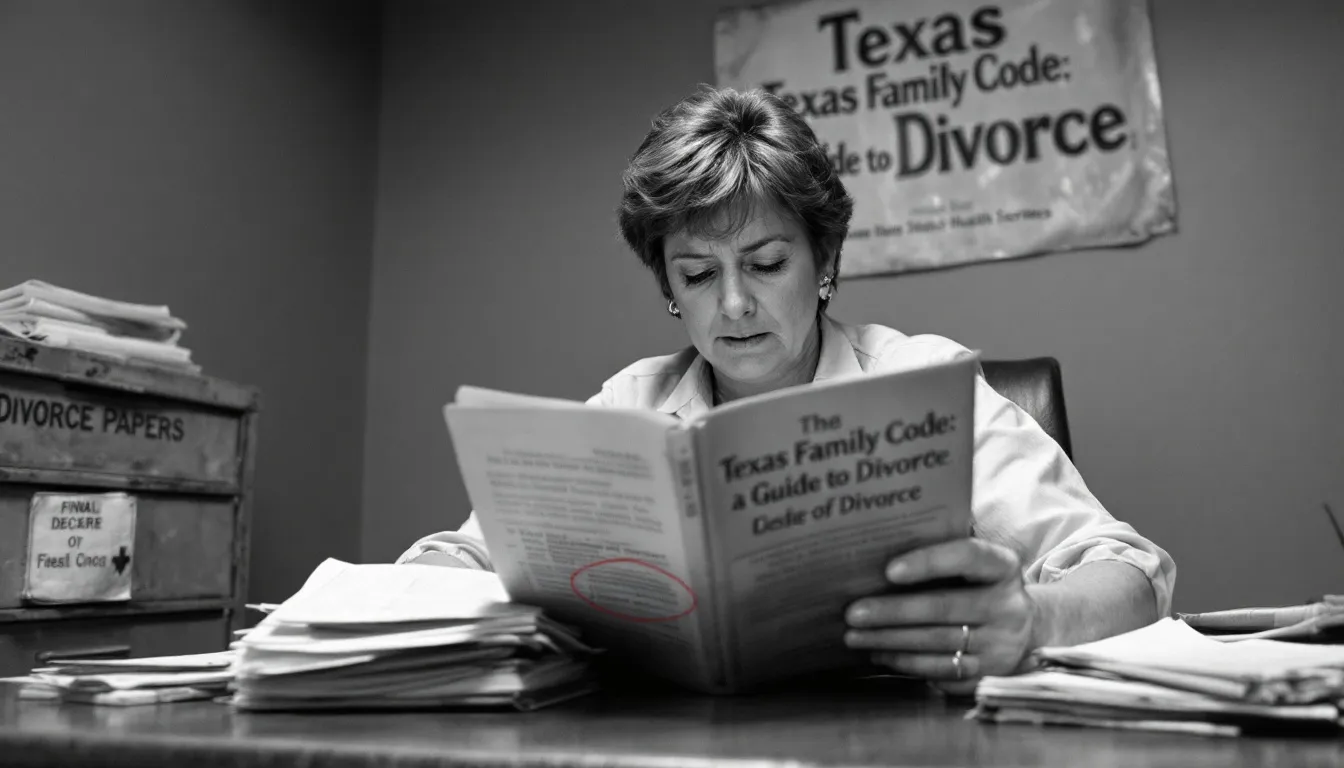
Let’s be honest—obtaining the Final Decree of Divorce in Texas sounds like something out of a courtroom drama, but in reality, it’s a detailed legal process that can feel as confusing as assembling a trampoline without instructions.
If you’ve ever found yourself buried in paperwork, Googling phrases like “What is a divorce decree?” or “Why is this taking so long?”—you’re not alone.
Short answer?
Obtaining the Final Decree of Divorce in Texas means completing all the required legal steps—from filing your initial petition and serving your spouse to finalizing property division, custody, and financial orders—so the judge can officially end your marriage.
Keep reading because this guide breaks it all down for you in plain English, with real-life stories, a little humor, and solid legal insight that makes the process a whole lot less overwhelming.
Key Takeaways
- The Final Decree of Divorce in Texas is a legally binding document that concludes a marriage and details rights and obligations related to property division, custody, and financial responsibilities.
- Obtaining the Final Decree involves a series of legal steps, including filing the Original Petition for Divorce, properly serving the other party, observing a mandatory waiting period, and potentially engaging in mediation or contested hearings.
- Working with a qualified family law attorney can significantly enhance the divorce process by providing strategic guidance to navigate legal complexities and ensuring the protection of rights and responsibilities.
Understanding the Final Decree of Divorce
A Final Decree of Divorce in Texas is more than just the end of a marriage—it’s a court order that legally finalizes your divorce and outlines your future obligations. It covers essential issues like property division, child custody, child support, and spousal maintenance in accordance with Texas Family Code § 6.706. Unlike a divorce certificate, which serves as a simple record, the decree is a detailed roadmap that shapes your post-divorce life.
Obtaining the Final Decree of Divorce in Texas requires careful attention to detail. Once signed by a judge and filed with the court, the decree becomes legally binding and enforceable. If your case involves children, modifications to custody or support terms later on must meet the legal standard of a “material and substantial change in circumstances” under Texas Family Code § 156.101. This is why it’s critical to fully understand and agree to every term before finalization.
At the Law Office of Bryan Fagan, PLLC, we help clients navigate the final stages of divorce with clarity and precision. Whether you’re drafting your decree or preparing for a final hearing, we’ll ensure your rights are protected and that your Final Decree supports a smooth transition into the next chapter of your life.

Legal Steps to Obtain the Final Decree of Divorce in Texas
Securing a divorce in Texas isn’t as simple as signing on the dotted line. It involves a series of structured legal steps outlined in the Texas Family Code, each of which must be followed precisely to reach the end goal—obtaining the Final Decree of Divorce in Texas. These steps include meeting residency requirements under Texas Family Code § 6.301, filing the Original Petition for Divorce, properly serving your spouse, observing the mandatory 60-day waiting period required by § 6.702, and participating in mediation or court hearings if disputes arise.
Every phase of the divorce process serves a critical purpose. Skipping or mishandling even one step can lead to delays, rejected filings, or court complications. That’s why understanding the full legal roadmap is essential when working toward obtaining the Final Decree of Divorce in Texas. Whether your divorce is uncontested or contested, the process must be handled with legal precision to ensure the court grants your final decree without unnecessary setbacks.
At the Law Office of Bryan Fagan, PLLC, we break down each step into clear, actionable guidance. From filing to final hearing, our team is here to make sure your divorce moves forward efficiently and in compliance with the latest Texas Family Code updates.

Filing the Original Petition for Divorce
The process begins with filing the Original Petition for Divorce in Texas. File this petition in the district court of the county where either spouse has resided for at least 90 days. State the grounds for the divorce and include necessary documents such as financial disclosures.
Providing accurate and comprehensive information is critical at this stage. The petition should provide specific details about the marriage and any specific requests regarding custody, support, and property division. This ensures that the court has all the required information to proceed with the case properly.
Filing the petition is the first legal step in the divorce process. Completing and accurately filing the petition can prevent unnecessary delays and complications.
Serving the Other Party
After filing the Original Petition for Divorce, the next step is serving the other party. Properly serving the divorce papers ensures the other spouse is legally notified of the proceedings. This can be done through a process server, sheriff, or constable, in accordance with the Texas Rules of Civil Procedure.
In Texas, divorce papers must be served in compliance with state law. This ensures the other spouse receives proper notice, allowing the court to proceed with the case. Proper service upholds the legal integrity of the divorce process.
Mandatory 60-Day Waiting Period
Texas law requires a 60-day waiting period after filing the Original Petition before a divorce can be finalized. This waiting period is legally required to comply with state regulations and serves as a reflection period for both parties.
Exceptions exist, such as cases involving family violence, where the waiting period can be waived. In most cases, observing this 60-day period is a crucial part of obtaining a final decree of divorce.
Temporary Orders
Temporary orders may address immediate concerns such as custody, support, and property division during the divorce process. These orders manage these issues until the final decree is issued.
Temporary orders can address urgent matters and provide immediate relief. They cover aspects like child custody and support for minor children, providing clear guidelines during the divorce proceedings.
Discovery and Negotiation
The discovery phase involves the exchange of relevant information and documents between parties. It is essential for gathering financial information and other relevant data to support claims and facilitate negotiations.
Negotiation during discovery can often lead to an amicable settlement, potentially avoiding further legal proceedings. Transparency and full disclosure ensure a fair and equitable resolution during this stage.
Mediation or Contested Hearings
If negotiation fails, Texas law allows for mediation as an alternative dispute resolution method. Mediation can expedite the divorce process compared to traditional court proceedings.
If mediation fails, the case may proceed to contested hearings for the court to resolve disputes regarding divorce terms when the divorce is contested. This final step addresses all unresolved issues, allowing the divorce to be finalized.
Drafting the Final Decree of Divorce
Drafting the Final Decree of Divorce is one of the most critical steps in obtaining the Final Decree of Divorce in Texas, and it must be done with precision. This document outlines the legal terms that govern life after divorce, including property division, conservatorship, visitation, and support. According to Texas Family Code § 6.706, the decree must clearly reflect the court’s judgment and meet all statutory requirements to be considered legally valid and enforceable.
Once the decree is carefully prepared and reviewed by both parties (or approved by the court in a contested case), it must be filed with the district clerk of the court where the divorce was granted. Filing fees vary by county, but payment of these fees and the judge’s signature are what officially finalize the divorce. Only after the court signs and enters the decree does it carry the full weight of law.
At the Law Office of Bryan Fagan, PLLC, we work closely with clients to ensure their Final Decree is complete, accurate, and in full compliance with current Texas law. If you’re navigating the final stages of your divorce, our team is here to help you move forward with confidence and legal clarity.

Essential Elements of the Final Decree
A Final Decree must clearly state the division of assets, child custody arrangements, and any child support obligations. Key components include the allocation of marital assets and debts between spouses. Custody and support arrangements for any children involved must be detailed to avoid future disputes. The decree should specify visitation rights and other necessary details to ensure clarity and compliance.
Filing for divorce Texas involves submitting an Original Petition for Divorce, which includes information about the marriage and specific requests regarding custody and support.
Using Blue or Black Ink
Using blue or black ink ensures readability and compliance with court submission standards for legal documents. Complete forms using these ink colors to ensure clarity and prevent photocopying issues.
Attaching a File Stamped Copy
Attach a file-stamped copy to validate the Final Decree. This ensures the document is officially recognized by the court and serves as proof of its legality.
Presenting the Decree to the Court
Presenting the decree to the court is the final and essential step in obtaining the Final Decree of Divorce in Texas. At this stage, the proposed decree is submitted to the judge, typically during a prove-up hearing. If the terms comply with the requirements outlined in Texas Family Code § 6.706 and accurately reflect the parties’ agreement or the court’s rulings, the judge will sign the document—officially ending the marriage and making the decree legally enforceable.
Once the judge signs the decree and it is filed with the court, the divorce becomes final. It’s important to request certified copies of the filed decree from the district clerk’s office. These copies serve as proof of your divorce and will be necessary for things like changing your name, updating your will, refinancing property, or modifying custody or support orders later under Texas Family Code § 156.101.
At the Law Office of Bryan Fagan, PLLC, we guide clients through the final presentation of the decree to ensure everything is legally sound and ready for court approval. Whether your divorce involves complex property division, child-related issues, or military benefits, our team ensures that every step toward obtaining the Final Decree of Divorce in Texas is handled with clarity and compliance.

Common Issues that May Delay the Process
Disputes over property division and parenting plans commonly delay the divorce process. Addressing these disputes early and working towards a compromise can avoid prolonged negotiations.
Emotional difficulties and hostility between spouses can result in intentional delays, further complicating the process. Responding promptly to discovery requests and maintaining transparency about financial disclosures can prevent delays.
To avoid delays, remain proactive, communicate effectively, and seek mediation or legal advice when necessary. This ensures the process proceeds smoothly and efficiently.
Working with a Qualified Family Law Attorney
Working with a knowledgeable attorney is one of the most important decisions you can make when it comes to obtaining the Final Decree of Divorce in Texas. A qualified family law attorney brings not only legal expertise but also an understanding of the nuances within the Texas Family Code and how local courts operate. According to Texas Family Code § 6.706, the decree must be drafted and entered properly for the divorce to be final and enforceable—something an experienced attorney ensures happens without costly mistakes.
At the Law Office of Bryan Fagan, PLLC, we believe that the right attorney-client relationship makes a significant difference. From helping you understand court procedures to negotiating favorable terms in property division or child custody, our team takes the time to align legal strategies with your personal goals. Many of our clients express how much relief and confidence they felt knowing their case was in capable hands.
Choosing a lawyer isn’t just about credentials—it’s about communication, trust, and advocacy. We are committed to guiding you through every step of the process, making obtaining the Final Decree of Divorce in Texas as smooth and stress-free as possible. Visit our resource page here to learn how to know when your divorce is officially finalized and what happens next.

Reviewing and Understanding the Final Decree
The Final Decree of Divorce is a binding court order outlining the terms of the divorce. Carefully review and understand all terms within the final divorce decree form before signing to avoid unforeseen legal obligations or loss of rights. Consulting a qualified family law attorney ensures full comprehension of the divorce decrees.
This ensures that all terms are clear and that you are fully aware of your rights and responsibilities under the limited scope agreement.
Real-Life Examples and Testimonials
Navigating a divorce can be daunting, but real-life examples and testimonials offer valuable insights and encouragement. One case study illustrated how a couple successfully navigated an uncontested divorce with a comprehensive toolkit from TexasLawHelp.org. This resource helped them understand the legal steps and avoid common pitfalls.
Another client praised their experience with Simple Texas Divorce, highlighting the exceptional support received from their attorney throughout the uncontested divorce process. The guidance and expertise of their attorney simplified the process and ensured a fair and amicable resolution.
Several testimonials emphasize the benefits of an amicable divorce. Clients expressed gratitude for the guidance that helped them navigate their separation positively. These stories underscore the importance of professional assistance in achieving a smooth and supportive divorce process.
Conclusion:
At the end of the day, obtaining the Final Decree of Divorce in Texas isn’t just about checking a box or filing one last form—it’s about turning the page and closing a chapter with clarity and confidence.
Whether your divorce was smooth sailing or more like surviving a Texas thunderstorm, reaching this point means you’ve come a long way. You’ve tackled paperwork, made tough decisions, and maybe even discovered how strong and capable you really are. The decree marks the legal end of your marriage, but it also signals the start of your next adventure—one that’s yours to define.
So take a deep breath. You’ve earned it. If you’re still working your way through the process, don’t worry—we’re here to guide you every step of the way. And if you’ve already crossed the finish line? Here’s to new beginnings, less stress, and a whole lot of peace ahead.






